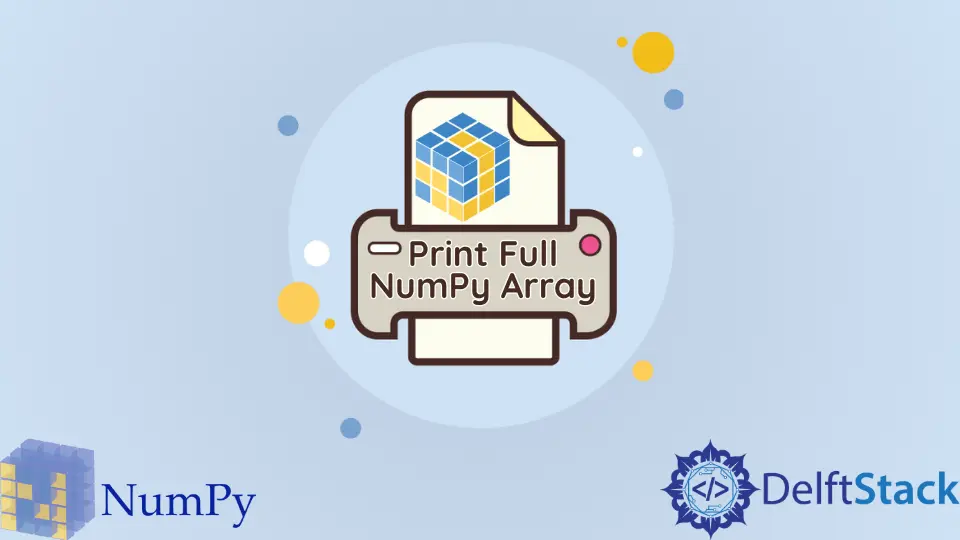打印完整的 NumPy 数组

本教程将介绍如何在 Python 中打印完整的 NumPy 数组。
使用 Python 中的 numpy.set_printoptions() 函数打印完整的 NumPy 数组
默认情况下,如果我们的数组长度很大,Python 会在打印数组时截断输出。下面的代码示例演示了这种现象。
import numpy as np
array = np.arange(10000)
print(array)
输出:
[ 0 1 2 ... 9997 9998 9999]
在上面的代码中,我们首先使用 Python 中的 np.arange() 函数创建了一个 NumPy 数组 array,其中包含从 0 到 9999 的数值。然后我们使用 print() 函数打印数组的元素。我们得到一个截断的输出,因为数组太大而无法完全显示。
这个问题可以通过 numpy.set_printoptions() 函数来解决。它在 Python 中设置与打印数组相关的不同参数。我们可以使用 numpy.set_printoptions() 函数的 threshold 参数来 sys.maxsize 打印完整的 NumPy 数组。要使用 sys.maxsize 属性,我们还必须导入 sys 库。下面的代码示例显示了如何在 Python 中使用 numpy.set_printoptions() 函数和 sys.maxsize 属性打印完整的 NumPy 数组。
import sys
import numpy as np
array = np.arange(10001)
np.set_printoptions(threshold=sys.maxsize)
print(array)
输出:
[ 0 1 2 3 4 5 6 7 8 9 10 11
12 13 14 15 16 17 18 19 20 21 22 23
24 25 26 27 28 29 30 31 32 33 34 35
36 37 38 39 40 41 42 43 44 45 46 47
48 49 50 51 52 53 54 55 56 57 58 59
60 61 62 63 64 65 66 67 68 69 70 71
72 73 74 75 76 77 78 79 80 81 82 83
84 85 86 87 88 89 90 91 92 93 94 95
96 97 98 99 100 101 102 103 104 105 106 107
108 109 110 111 112 113 114 115 116 117 118 119
...
9912 9913 9914 9915 9916 9917 9918 9919 9920 9921 9922 9923
9924 9925 9926 9927 9928 9929 9930 9931 9932 9933 9934 9935
9936 9937 9938 9939 9940 9941 9942 9943 9944 9945 9946 9947
9948 9949 9950 9951 9952 9953 9954 9955 9956 9957 9958 9959
9960 9961 9962 9963 9964 9965 9966 9967 9968 9969 9970 9971
9972 9973 9974 9975 9976 9977 9978 9979 9980 9981 9982 9983
9984 9985 9986 9987 9988 9989 9990 9991 9992 9993 9994 9995
9996 9997 9998 9999 10000]
在上面的代码中,我们首先使用 numpy.arange() 函数创建了一个 NumPy 数组 array,其中包含从 0 到 10000 的元素。我们使用 np.set_printoptions(threshold = sys.maxsize) 函数将数组的打印选项设置为最大值。然后我们在 Python 中使用简单的 print() 函数打印了完整的数组。
我们的问题还有另一种解决方案,它只涉及使用 NumPy 库。我们可以在 numpy.set_printoptions() 函数中指定 threshold 等于 np.inf 以在 Python 中打印完整的数组。np.inf 属性指定 print() 将无限运行,直到打印整个数组。请参考以下代码示例。
import numpy as np
array = np.arange(10001)
np.set_printoptions(threshold=np.inf)
print(array)
输出:
[ 0 1 2 3 4 5 6 7 8 9 10 11
12 13 14 15 16 17 18 19 20 21 22 23
24 25 26 27 28 29 30 31 32 33 34 35
36 37 38 39 40 41 42 43 44 45 46 47
48 49 50 51 52 53 54 55 56 57 58 59
60 61 62 63 64 65 66 67 68 69 70 71
72 73 74 75 76 77 78 79 80 81 82 83
84 85 86 87 88 89 90 91 92 93 94 95
96 97 98 99 100 101 102 103 104 105 106 107
108 109 110 111 112 113 114 115 116 117 118 119
...
9912 9913 9914 9915 9916 9917 9918 9919 9920 9921 9922 9923
9924 9925 9926 9927 9928 9929 9930 9931 9932 9933 9934 9935
9936 9937 9938 9939 9940 9941 9942 9943 9944 9945 9946 9947
9948 9949 9950 9951 9952 9953 9954 9955 9956 9957 9958 9959
9960 9961 9962 9963 9964 9965 9966 9967 9968 9969 9970 9971
9972 9973 9974 9975 9976 9977 9978 9979 9980 9981 9982 9983
9984 9985 9986 9987 9988 9989 9990 9991 9992 9993 9994 9995
9996 9997 9998 9999 10000]
我们使用 np.set_printoptions() 函数将 threshold 参数设置为 np.inf。然后我们在 Python 中使用简单的 print() 函数打印了完整的数组。这种方法优于前一种方法,因为这种方法只需要 NumPy 库。
Maisam is a highly skilled and motivated Data Scientist. He has over 4 years of experience with Python programming language. He loves solving complex problems and sharing his results on the internet.
LinkedIn